From place names to pronouns, the English language is full of surprises. Many of them are thanks to the Vikings. Discover how Old Norse left its lasting mark on modern English.
They may have spent decades invading, but the Vikings and their descendants left their mark on the British Isles in more ways than one. The English language wouldn't be what it is today without the influence from the Norse people.
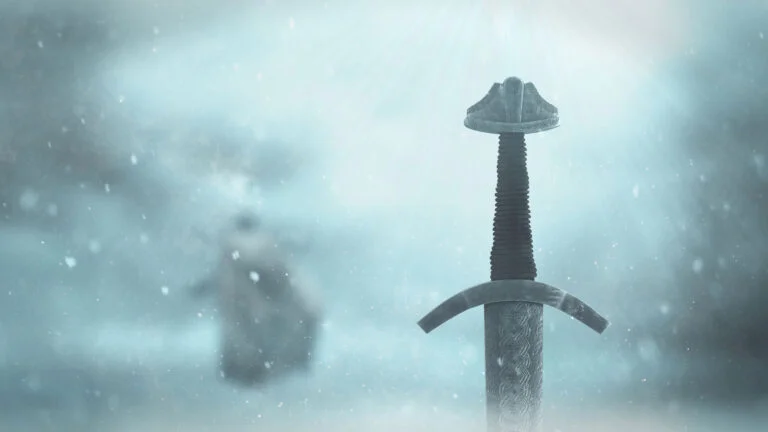
In the 9th and 10th centuries, Scandinavians crossed the North Sea in great numbers. Their legacy is still very much alive in hundreds of place names and personal names, not to mention everyday items and even days of the week.
An article in the research journal Antiquity suggested that the number of Scandinavians moving to the British Isles during the Viking Age may have been larger than previous DNA studies suggested.
As many as 35,000 Scandinavians may have relocated to England. Eventually, these newcomers settled across the country, marrying into local families.
Most of the Nordic languages spoken today trace their roots back to Old Norse, which also had its influence on the English language.
Scandinavians lived and farmed alongside the Old English speakers in the time of Danelaw. So, it's perhaps no surprise that the English language developed to include many terms previously only used in Old Norse.
Old Norse and Old English
Before we dive into the specifics of Viking words, it's important for context to take a look at the languages of the time.
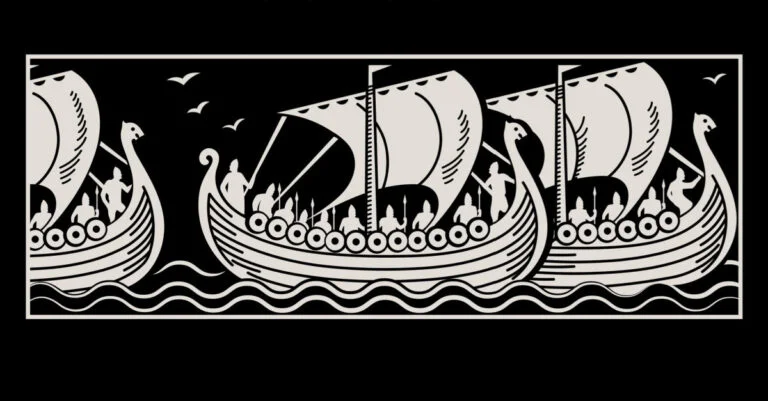
Old English, the language spoken in much of the British Isles at the time, was quite a different language to the one we know today. In much the same way as Old Norse is very difficult to read for a Norwegian today, Old English would be a challenge to a native English speaker.
English and Old Norse are both members of the Germanic language family. Although distantly related today, some 1,200 years ago Old English and Old Norse were more closely related.
It's hard to know for sure because of the primarily spoken nature of language of the time, but it's possible that the two languages were to some extent mutually intelligible.
Read more: The Languages of Norway
This means that Old English adapting to include some Old Norse words wouldn't have seemed particularly strange at the time. It's only by looking back with hindsight that we can see how big an influence the Scandinavians had.
Mapping the Norse Legacy: Viking Place Names
I grew up just a few miles from a small village called Naseby. I didn't know it at the time, but this was my first exposure to a Viking-influenced place name.
The hint? Look for a -by suffix at the end of the name. Still used in Norwegian today, by simply means place, town or city, although it used to mean farm.
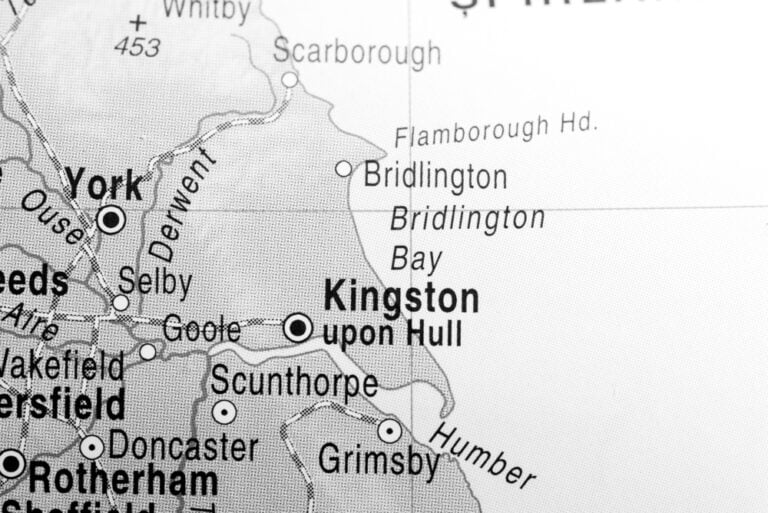
In the British Isles today there are hundreds of place names of Old Norse origin. Many of them are in Yorkshire and Lincolnshire, which fall within the former boundaries of the Danelaw.
The suffix -by (from Old Norse býr, meaning farm or settlement) is one of the clearest markers of Viking influence. Examples include:
- Grimsby, meaning “Grim’s village”
- Derby, from Djúrabýr or “village of the deer”
- Whitby, meaning “white settlement”
- Selby, from selja býr, possibly “willow farm”
Other common Norse place-name elements include:
- -thorpe, from þorp, meaning a small village or secondary settlement. Found in names like Scunthorpe and Cleethorpes.
- -kirk or Kirk-, from kirkja, meaning church. Kirkby, Ormskirk and Kirkstall all bear this marker.
- -holm or -hulme, from holmr, meaning an islet or raised ground in marshy land.
- -ness, from nes, meaning headland or promontory—Skegness, Dungeness.
- Thwaite, from þveit, meaning a clearing or meadow, as in Braithwaite or Applethwaite.
Even the capital city of York bears a Norse name. Once the Roman town of Eboracum and later the Anglo-Saxon Eoforwic, the Vikings renamed it Jórvík, which evolved into modern-day York.
Personal Pronouns: They, Them and Their
Even if you don't know the specifics, many people have heard that there are place names of Viking origin in England. However, I'd wager that far fewer know about the Old Norse origins of personal pronouns.
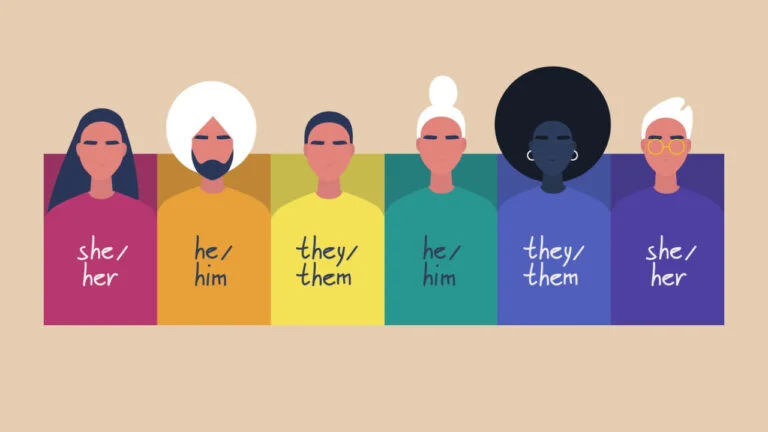
Among the most surprising Viking influences on English are the third-person plural pronouns: they, them, and their. These come directly from Old Norse (þeir, þeim, þeira), replacing the Old English equivalents hīe, him, and heora.
This linguistic shift wasn’t purely random. It may have helped avoid confusion with similar-sounding singular pronouns like he and him, especially as dialects mingled. The Norse forms gained traction in areas of Viking settlement and gradually spread throughout the country, eventually entering standard English.
The shift was so complete that most English speakers today have no idea these most common words are Viking imports.
Verbs from the North
The Vikings gave English a surprising number of common verbs. These often replaced native Old English words, possibly because the Norse forms were simpler or more widely understood in the new mixed communities.
Here are some key examples:
- Take, from Old Norse taka, replaced Old English niman
- Give, from gefa
- Die, from deyja, displaced the Old English sweltan
- Call, from kalla
- Lift, from lypta
- Hug, possibly from hugga, meaning to comfort
- Ski, from skíð, a Norse innovation that still defines Scandinavian culture
Even auxiliary verbs and conjugations were affected. The English word are (as in they are) is a hybrid of Old Norse eru and Old English earun, blending forms that were already similar.
Words of War and Survival
Given the Vikings’ early reputation as warriors, it’s no surprise that many military and conflict-related words in English are of Norse origin.

These include:
- Slaughter, from slátr, meaning butchered meat
- Ransack, from rannsaka, meaning to search a house
- Scathe, meaning harm or damage
- Knife, from knífr
- Axe, from øx
- Club, from klubba
One of the most colourful additions is berserk, from berserkr, a compound of ber (bear) and serkr (shirt). It referred to warriors who fought with frenzied rage, said to wear bear skins into battle and channel animalistic energy.
Norse in Regional Dialects
In the north and east of England, Norse influence remains visible in dialect speech. In Yorkshire, Cumbria and parts of Lancashire, you’ll still hear people refer to a child as a bairn or barn, just like in modern Norwegian (barn).
The word dale meaning valley likely comes from the Old Norse dalur, which has become dal in modern Norwegian. There are many other words of Norse origin used in and around Yorkshire that you can read about here.
Other examples include:
- Lad and lass, common in northern England, possibly from Norse roots
- Dale, from dalr, still seen in names like Swaledale and Wensleydale
- Garth, a word for yard or enclosure
- Beck, meaning stream, from bekkr
- Laik, meaning to play or have fun, from leika
Some dialects retain Norse grammar too. In Shetland, for instance, the local dialect includes reflexes of Norse vocabulary and syntax even centuries after the language itself disappeared.
The Curious Case of Norn
Perhaps the most direct descendant of Old Norse in the British Isles was Norn, once spoken in Shetland, Orkney and parts of Caithness. It developed from Norse brought by settlers in the 9th century and remained in use well into the 18th century.
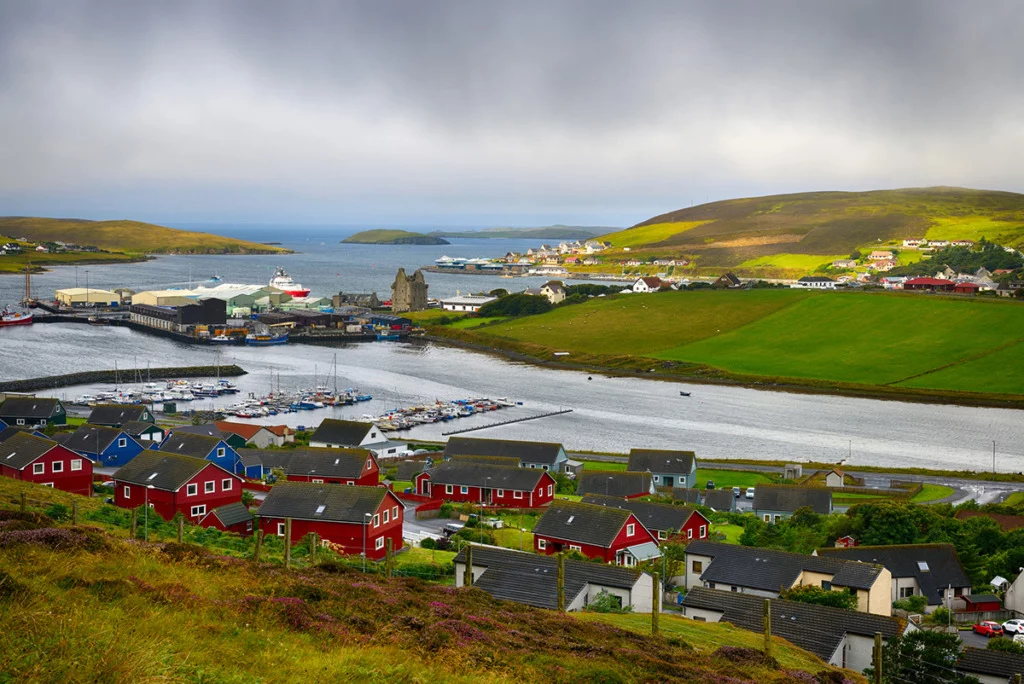
Norn was never a written language in the way Old Norse was, and it gradually gave way to Scots and English. The last native speakers likely died in the early 1800s, although fragments survive in ballads, place names and vocabulary.
Today, traces of Norn still echo in Shetlandic English, particularly in pronunciation and certain expressions. NorthLink Ferries gives a good summary of words still in regular use.
Some enthusiasts have even attempted to reconstruct or revive Norn as a cultural project.
The Norse Legacy in Names
Personal names in Britain also reflect Norse heritage. Names like Eric, Harold, Rolf, Gunnar, and Astrid are all of Old Norse origin and remain in use today. Surnames such as Halsall, Thorpe, Kirk, and Rogerson may also reflect Viking roots.
The name Norman, ironically, comes from Norðmaðr, meaning “Northman”—a nod to the Norsemen who settled in Normandy before invading England in 1066.
Why This Matters
The story of Norse influence on English is more than a historical footnote. It’s a powerful example of how languages evolve through contact, conflict and coexistence.
Far from disappearing, the Norse language was absorbed, adapted and spread across centuries of English speech.
So the next time you say they are going to take the eggs by the window, spare a thought for the Viking traders, farmers and warriors who helped give those words to the English language.
Their influence is written not just on the map—but in every sentence we speak.



Another borrowing from Old Norse led to the development of pairs of words. ‘Sc’ was found in words of both Old English and Old Norse But the pronounciation differed,being ‘sh’ in Old English and’sk’ in Old Norse. This rise to pairs of words such as ‘shirt/skirt’ and ‘shrimp/skimp’.
The most important effect that Old Norse had on English was to start its transformation from a synthetic language with case endings to the analytical uninfected tongue we have today. The root words used by the Danes and English were often very similar but case endings and gender were mostly different. To overcome this, they quickly dropped the inflections and used prepositions instead which aided mutual understanding.
Until I learned Norwegian I never thought much about the place names in Yorkshire. My favourite is Ugglebarnby, which you might imagine was a place with lots of owls. But apparently not … it’s a place with a bearded owner… https://www.darlingtonandstocktontimes.co.uk/news/8203110.ugglebarnby-lives-up-to-its-curious-nordic-name/
‘Thorpe’ is the Dutch word ‘dorp’ (village). ‘Dale’ is the Dutch word ‘dal’ (valley). ‘Kirk’ is the Dutch word ‘kerk’ (church).
There are many Dutch and English words coming from the same origin, mostly Old-Germanic or even Indo-Germanic. The Old-Germanic ‘th’ sound has remained/survived in English, but in most Germanic languages become a ‘d’ (English/Dutch: the/de, thorpe/dorp, thick/dik, thin/dun, think/denk, through/door, there/daar, this/dit, these/die, etc)
You forgot about one major county that had massive influence of viking heritage. NORFOLK. its capitol Norwich…norvic was a major factor for the mass waterways in the east. We are prolific boat builders then and now. The fenns and the broads with 2/3 of a coast line. Many many place names, districts, marshs, carrs, bogs, wetlands, farms and waterways are heavily norse in origin. After all, Ivar the boneless and king canute ruled here in danelaw. It was our rich fertile soil,abundance of woodland and the most churches in the whole country they blundered.
The city of Swansea in Wales, UK, took its name from Sweyn’s Eye – the island of Sweyn/Swein, supposedly a Viking warrior who attacked what was then a very small settlement. It took on various spellings until Swansea became the settled spelling. So the name Swansea has nothing to do with SWANS and the SEA. Near Swansea is Worm’s Head (Rhosilli, Gower). Worm is said to have originated from the Viking word WURM (dragon) because as the Vikings approached they thought it looked like a dragon.
I love this, as the trace elements of certain words are vestiges of people long gone. There were many words in my youth one expression, ‘The HAAR is coming in’, meaning the fog is rolling in over the sea. I think this was referring to long hair such expressive words.